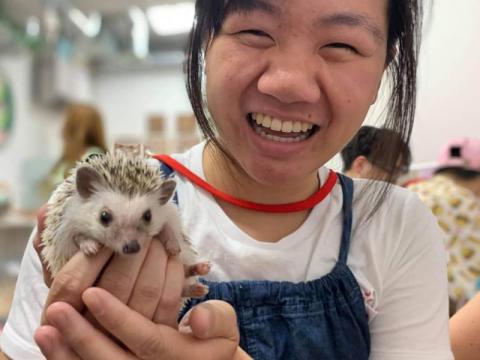Celinda Chang
Middlebury School in Japan (ISO), Tokyo, Japan

Biography
Name: Celinda Chang, Class of 2020
Email: cchang15@tulane.edu
Program: Middlebury School in Japan (ISO), Tokyo, Japan, Academic Year 2018-19
Fields of Study: Asian Studies, Health & Wellness, SLAMM minor
How did studying abroad affect your academic and/or professional career?
When I came to Tulane, I had no clue what I wanted to study or what career I wanted, but I knew that I wanted to keep taking Japanese language classes. Realizing my passion, I chose Asian Studies as my major and made it a goal to study abroad in Japan to further explore the language and culture. Going abroad was also helpful in my case because it allowed me to take the language courses that I was not able to at Tulane, having come in at a higher level and in a small language department- I was able to take and pass the Japanese Language Proficiency Test (JLPT) N2 level at the end of my year abroad, which also opened up doors for further academic and professional opportunities in Japan. In terms of professional career, I was fortunate to have received the Boren Award, which shifted my focus to and provides support for careers in government service, and my immersion experience abroad solidified my desire to work with US-Japan relations as well as spread awareness of the importance and benefits of cultural exchange.
How did you explore your hobbies, interests, and passions abroad?
To be honest, learning about Japanese language, culture, history, and society are interests and passions of mine, so studying in Japan itself was exploration for me. I also got to be an advocate for American, Chinese, and Chinese American culture, which gave me plenty of opportunity to reflect on my identity, and realize how much I enjoy cultural exchange and why it is important to share. I did join a number of student organizations: traditional Japanese dance, copy dance (think K-pop), and street dance, which were extremely fun and through which I made numerous friends with similar interests. I also had the opportunity to complete volunteer internships at a local sweets shop and a hospital, which were extremely meaningful and rewarding and improved my language and cross-cultural competency.
Why would you recommend your respective abroad program or location?
Through the Independent Scholar Option, I studied in Tokyo at the Middlebury School in Japan. The Middlebury program was incredible because of its guided independence. First of all, we were on a Language Pledge to communicate only in Japanese, which was difficult at first but really improved my language skills and confidence quickly and pushed me to challenge myself to use the language in situations in which I would have otherwise been nervous or embarrassed to. The Middlebury courses and program activities were structured to give us guidance in fieldwork and exploration but we were given lots of freedom to make our time in Tokyo uniquely ours. The Middlebury professors and staff at the School in Japan are extremely kind, fun, and supportive, and our little Middlebury cohorts were like a family. The host university, International Christian University (ICU), also provided ample opportunity for international students to engage in cultural exchange as well as join organizations and play active roles in student life. Overall, spending a year in Japan was an amazing opportunity for me to explore and immerse in the language and culture that I have been studying for so long, so I certainly recommend study abroad in Japan for people studying Japanese or Asian Studies.
What should students consider when applying and preparing for their time abroad?
Students should consider their goals. Where do you want to go? What do you want to do? But most importantly, what to you want to achieve? Thinking about this question as you begin applying and before departure can be helpful in shaping and keeping yourself accountable of your academic, professional, and personal needs. It's a great way of keeping track of milestones and growth, and I certainly recommending keeping record of your time abroad through writing in a journal, taking pictures, or updating a blog. These are also fun ways to share your adventures with your family and friends at home and spark precious memories when you look back once study abroad is over, even years and years past.
Share a story about a time you experienced cultural immersion.
I like to think about my entire abroad experience as cultural immersion, but I'll pick one story to share. I happened to turn 20 while I was in Japan- the official age of adulthood, much like turning 18 or even 21 is in the US. As part of tradition, all Japanese residents who had reached adulthood and turned 20 in the last year were invited to participate in the Coming of Age Ceremony (成人式 sei-jin-shiki), hosted by municipal governments throughout the country. Because I was a registered resident, I was invited to attend and take part in this once-in-a-lifetime experience. There were speeches, performances, and resources for new adults, and the event served as a high-school reunion of sorts, as people often return to their hometowns for the ceremony. I was surrounded by girls in beautiful, expensive kimonos and boys in their best suits and felt so lucky to have gotten to not seen it for my own eyes but take part in it. I truly felt like a part of the community. To hear more about cultural immersion in Japan (like the changing to the Reiwa era or going on excursions with the traditional Japanese dance club), reach out or make an appointment- I'm a Peer Advisor with OSA!
